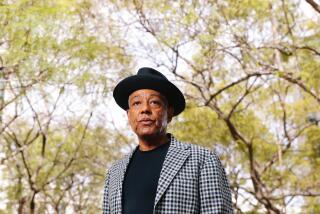The Artistic Success of Dennis Hopper : The Actor’s Life Is Tranquil; It’s the Roles That Remain Dangerous
- Share via
The exterior of Dennis Hopper’s house, tucked away on a graffiti-tagged side street in Venice, is made of corrugated steel. It looks like the facade of a factory or a repair shop, just another gray-metal piece of industrial real estate, easy to miss in a run-down neighborhood of housing projects, junked cars and trash-strewn alleys.
It’s a rough part of town. There have been shootings a block away. There are gangs. But there are also artists nearby, warehouse lofts where painters and sculptors have been living for years, places where artists like Ed Ruscha and Kenneth Price got their start. It’s a neighborhood where art and danger, two things that always have attracted Dennis Hopper, live side by side.
That’s why he moved here in the first place, 18 years ago. And why, in dramatic contrast to the free-fire zone outside, the interior of Hopper’s home is like a modern art museum, all skylights and wall space and gallery after gallery of huge canvases and sculptures.
There’s a chandelier made of loose fragments of shattered glass, a Julian Schnabel portrait of Hopper’s wife, Katherine, fashioned out of broken dishes. There is a Rauschenberg on the wall by the upstairs kitchen that looks like a twisted piece of highway guardrail. Art and danger, intertwined.
“The street is pretty frightening for most people,” Hopper is saying, sitting in an upstairs gallery that also happens to be his dining room, watching carefully as workmen hang more paintings on the wall. “But people here don’t seem hostile to me. There’s gang stuff, but it really hasn’t affected me. We seem to coexist.”
If he sounds calm in the midst of chaos, it’s because Dennis Hopper, 54, is as close to settled down as he’s likely to get. He’s happily married to his fourth wife, a 23-year-old ballet dancer; they have a 10-month-old son named Henry. After decades of legendary exploits on brain-bending chemicals, he hasn’t partaken of drugs or alcohol in nearly eight years--and they’ve been the most productive eight years of his life.
Ever since his breathtakingly psychotic appearance in David Lynch’s “Blue Velvet,” in 1986, Hopper’s professional renaissance has taken him from one critically acclaimed role to another, from “Hoosiers” to “River’s Edge” to his chilling portrayal earlier this year of a killer in the cable TV movie “Paris Trout,” a performance that many critics labeled the best of Hopper’s career.
His director’s credentials, tarnished in the drug-crazed years since “Easy Rider” in 1969, were re-established with “Colors” in 1988 and “The Hot Spot” in 1990. The outlaw years behind him, his head straight, his hair short, his closet filled with expensive suits, Dennis Hopper had become part of the Establishment at last.
Even so, Hopper still gets hungry for a taste of the edge, although not in the heavy doses he once required. For instance, he no longer feels the need to sit in a circle of exploding dynamite (a performance-art stunt he survived once in Houston).
His thrills now come on-screen, playing characters who remind him of his dangerous side, of the way he used to be. That’s how Hopper ended up in an HBO movie called “Doublecrossed,” the true story of a drug-smuggling Louisiana thrill-jockey pilot named Barry Seal who turned informant, blew the lid off the Medellin drug cartel and, in the end, was murdered.
“Seal likes the excitement of hitting that dirt airfield in the middle of a jungle and the excitement of getting shot at,” Hopper is saying, explaining why he took the role. Hopper understands why Seal, who never took drugs himself, was attracted to the drug-smuggling world. It was the same element that had attracted him.
“I loved the danger of it all,” Hopper says. “I loved being in the criminal life. I loved that involvement with the underworld.”
It doesn’t bother Hopper that his art so often imitates his life, or at least refers to it. He knows it’s no coincidence that he’s often cast as substance abusers or psychotics or burned-out hippie subversives. “No, that’s OK thinking as far as I’m concerned,” he says. “As long as it gets me parts like Barry Seal, I don’t have a problem with it.
“When I was in France promoting ‘Paris Trout’ (which was released as a theatrical film in Europe) some guy said to me, ‘You’ve finally come full circle with this part, haven’t you?’ And I didn’t understand what he meant. He said, ‘You finally played the guy that shot you in “Easy Rider.” ’ I thought that was pretty funny.”
Never shy about critiquing his own performances, Hopper thinks “Doublecrossed” contains some of his best work. He’s proud that, for a change, he plays a character with subtle emotions, something other than an out-and-out psycho. “Some of the scenes are really beautifully acted,” he says, “if I may say so myself.”
“Doublecrossed” will air Saturday at 9 p.m. on HBO (cable).
More to Read
The biggest entertainment stories
Get our big stories about Hollywood, film, television, music, arts, culture and more right in your inbox as soon as they publish.
You may occasionally receive promotional content from the Los Angeles Times.










